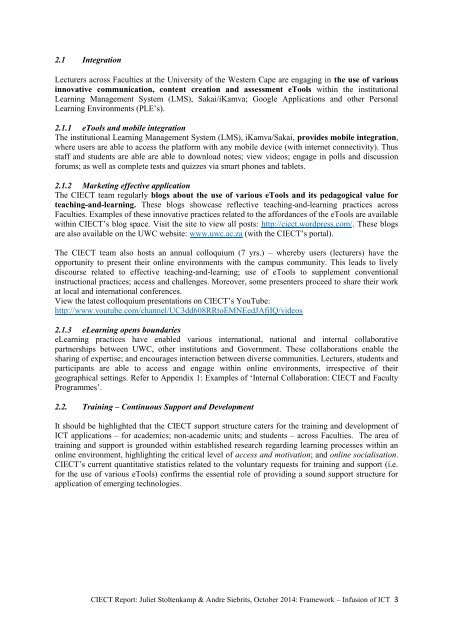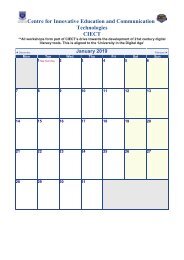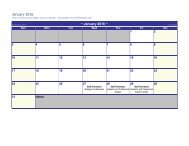CIECT 2014 Report
You also want an ePaper? Increase the reach of your titles
YUMPU automatically turns print PDFs into web optimized ePapers that Google loves.
2.1 Integration<br />
Lecturers across Faculties at the University of the Western Cape are engaging in the use of various<br />
innovative communication, content creation and assessment eTools within the institutional<br />
Learning Management System (LMS), Sakai/iKamva; Google Applications and other Personal<br />
Learning Environments (PLE’s).<br />
2.1.1 eTools and mobile integration<br />
The institutional Learning Management System (LMS), iKamva/Sakai, provides mobile integration,<br />
where users are able to access the platform with any mobile device (with internet connectivity). Thus<br />
staff and students are able are able to download notes; view videos; engage in polls and discussion<br />
forums; as well as complete tests and quizzes via smart phones and tablets.<br />
2.1.2 Marketing effective application<br />
The <strong>CIECT</strong> team regularly blogs about the use of various eTools and its pedagogical value for<br />
teaching-and-learning. These blogs showcase reflective teaching-and-learning practices across<br />
Faculties. Examples of these innovative practices related to the affordances of the eTools are available<br />
within <strong>CIECT</strong>’s blog space. Visit the site to view all posts: http://ciect.wordpress.com/. These blogs<br />
are also available on the UWC website: www.uwc.ac.za (with the <strong>CIECT</strong>’s portal).<br />
The <strong>CIECT</strong> team also hosts an annual colloquium (7 yrs.) – whereby users (lecturers) have the<br />
opportunity to present their online environments with the campus community. This leads to lively<br />
discourse related to effective teaching-and-learning; use of eTools to supplement conventional<br />
instructional practices; access and challenges. Moreover, some presenters proceed to share their work<br />
at local and international conferences.<br />
View the latest colloquium presentations on <strong>CIECT</strong>’s YouTube:<br />
http://www.youtube.com/channel/UC3dd608RRtoEMNEedJAfiIQ/videos<br />
2.1.3 eLearning opens boundaries<br />
eLearning practices have enabled various international, national and internal collaborative<br />
partnerships between UWC, other institutions and Government. These collaborations enable the<br />
sharing of expertise; and encourages interaction between diverse communities. Lecturers, students and<br />
participants are able to access and engage within online environments, irrespective of their<br />
geographical settings. Refer to Appendix 1: Examples of ‘Internal Collaboration: <strong>CIECT</strong> and Faculty<br />
Programmes’.<br />
2.2. Training – Continuous Support and Development<br />
It should be highlighted that the <strong>CIECT</strong> support structure caters for the training and development of<br />
ICT applications – for academics; non-academic units; and students – across Faculties. The area of<br />
training and support is grounded within established research regarding learning processes within an<br />
online environment, highlighting the critical level of access and motivation; and online socialisation.<br />
<strong>CIECT</strong>’s current quantitative statistics related to the voluntary requests for training and support (i.e.<br />
for the use of various eTools) confirms the essential role of providing a sound support structure for<br />
application of emerging technologies.<br />
<strong>CIECT</strong> <strong>Report</strong>: Juliet Stoltenkamp & Andre Siebrits, October <strong>2014</strong>: Framework – Infusion of ICT 3






